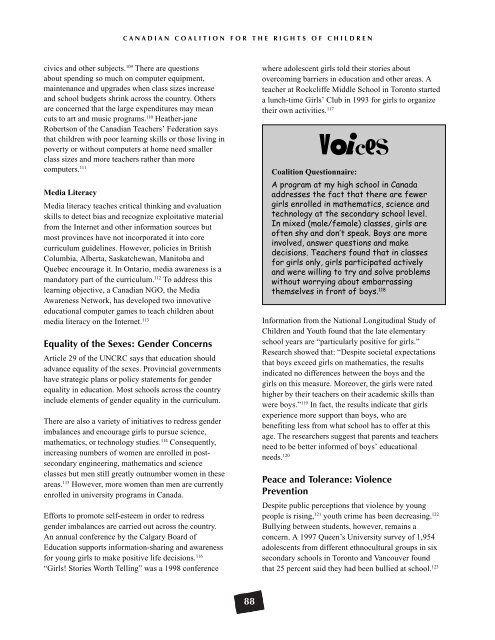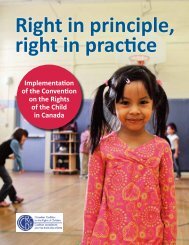Poste - Canadian Coalition for the Rights of Children
Poste - Canadian Coalition for the Rights of Children
Poste - Canadian Coalition for the Rights of Children
Create successful ePaper yourself
Turn your PDF publications into a flip-book with our unique Google optimized e-Paper software.
C A N A D I A N C O A L I T I O N F O R T H E R I G H T S O F C H I L D R E N<br />
civics and o<strong>the</strong>r subjects. 109 There are questions<br />
about spending so much on computer equipment,<br />
maintenance and upgrades when class sizes increase<br />
and school budgets shrink across <strong>the</strong> country. O<strong>the</strong>rs<br />
are concerned that <strong>the</strong> large expenditures may mean<br />
cuts to art and music programs. 110 Hea<strong>the</strong>r-jane<br />
Robertson <strong>of</strong> <strong>the</strong> <strong>Canadian</strong> Teachers’ Federation says<br />
that children with poor learning skills or those living in<br />
poverty or without computers at home need smaller<br />
class sizes and more teachers ra<strong>the</strong>r than more<br />
computers. 111<br />
Media Literacy<br />
Media literacy teaches critical thinking and evaluation<br />
skills to detect bias and recognize exploitative material<br />
from <strong>the</strong> Internet and o<strong>the</strong>r in<strong>for</strong>mation sources but<br />
most provinces have not incorporated it into core<br />
curriculum guidelines. However, policies in British<br />
Columbia, Alberta, Saskatchewan, Manitoba and<br />
Quebec encourage it. In Ontario, media awareness is a<br />
mandatory part <strong>of</strong> <strong>the</strong> curriculum. 112 To address this<br />
learning objective, a <strong>Canadian</strong> NGO, <strong>the</strong> Media<br />
Awareness Network, has developed two innovative<br />
educational computer games to teach children about<br />
media literacy on <strong>the</strong> Internet. 113<br />
Equality <strong>of</strong> <strong>the</strong> Sexes: Gender Concerns<br />
Article 29 <strong>of</strong> <strong>the</strong> UNCRC says that education should<br />
advance equality <strong>of</strong> <strong>the</strong> sexes. Provincial governments<br />
have strategic plans or policy statements <strong>for</strong> gender<br />
equality in education. Most schools across <strong>the</strong> country<br />
include elements <strong>of</strong> gender equality in <strong>the</strong> curriculum.<br />
There are also a variety <strong>of</strong> initiatives to redress gender<br />
imbalances and encourage girls to pursue science,<br />
ma<strong>the</strong>matics, or technology studies. 114 Consequently,<br />
increasing numbers <strong>of</strong> women are enrolled in postsecondary<br />
engineering, ma<strong>the</strong>matics and science<br />
classes but men still greatly outnumber women in <strong>the</strong>se<br />
areas. 115 However, more women than men are currently<br />
enrolled in university programs in Canada.<br />
Ef<strong>for</strong>ts to promote self-esteem in order to redress<br />
gender imbalances are carried out across <strong>the</strong> country.<br />
An annual conference by <strong>the</strong> Calgary Board <strong>of</strong><br />
Education supports in<strong>for</strong>mation-sharing and awareness<br />
<strong>for</strong> young girls to make positive life decisions. 116<br />
“Girls! Stories Worth Telling” was a 1998 conference<br />
88<br />
where adolescent girls told <strong>the</strong>ir stories about<br />
overcoming barriers in education and o<strong>the</strong>r areas. A<br />
teacher at Rockcliffe Middle School in Toronto started<br />
a lunch-time Girls’ Club in 1993 <strong>for</strong> girls to organize<br />
<strong>the</strong>ir own activities. 117<br />
Voices<br />
<strong>Coalition</strong> Questionnaire:<br />
A program at my high school in Canada<br />
addresses <strong>the</strong> fact that <strong>the</strong>re are fewer<br />
girls enrolled in ma<strong>the</strong>matics, science and<br />
technology at <strong>the</strong> secondary school level.<br />
In mixed (male/female) classes, girls are<br />
<strong>of</strong>ten shy and don’t speak. Boys are more<br />
involved, answer questions and make<br />
decisions. Teachers found that in classes<br />
<strong>for</strong> girls only, girls participated actively<br />
and were willing to try and solve problems<br />
without worrying about embarrassing<br />
<strong>the</strong>mselves in front <strong>of</strong> boys. 118<br />
In<strong>for</strong>mation from <strong>the</strong> National Longitudinal Study <strong>of</strong><br />
<strong>Children</strong> and Youth found that <strong>the</strong> late elementary<br />
school years are “particularly positive <strong>for</strong> girls.”<br />
Research showed that: “Despite societal expectations<br />
that boys exceed girls on ma<strong>the</strong>matics, <strong>the</strong> results<br />
indicated no differences between <strong>the</strong> boys and <strong>the</strong><br />
girls on this measure. Moreover, <strong>the</strong> girls were rated<br />
higher by <strong>the</strong>ir teachers on <strong>the</strong>ir academic skills than<br />
were boys.” 119 In fact, <strong>the</strong> results indicate that girls<br />
experience more support than boys, who are<br />
benefiting less from what school has to <strong>of</strong>fer at this<br />
age. The researchers suggest that parents and teachers<br />
need to be better in<strong>for</strong>med <strong>of</strong> boys’ educational<br />
needs. 120<br />
Peace and Tolerance: Violence<br />
Prevention<br />
Despite public perceptions that violence by young<br />
people is rising, 121 youth crime has been decreasing. 122<br />
Bullying between students, however, remains a<br />
concern. A 1997 Queen’s University survey <strong>of</strong> 1,954<br />
adolescents from different ethnocultural groups in six<br />
secondary schools in Toronto and Vancouver found<br />
that 25 percent said <strong>the</strong>y had been bullied at school. 123




